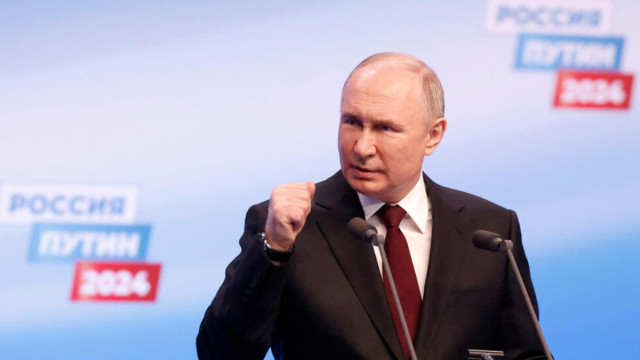President Vladimir Putin won a record post-Soviet landslide in Russia's election, cementing his already tight grip on power in a victory amidst the current war between Russian and Ukraine.
Putin, a former KGB lieutenant colonel who first rose to power in 1999, made it clear that the result should send a message to the West that its leaders will have to reckon with an emboldened Russia, whether in war or in peace, for many more years to come.
The outcome means Putin, 71, is set to embark on a new six-year term that will see him overtake Josef Stalin and become Russia's longest-serving leader for more than 200 years if he completes it.
Putin won 87.8% of the vote, the highest ever result in Russia's post-Soviet history, according to an exit poll by pollster the Public Opinion Foundation (FOM). The Russian Public Opinion Research Centre (VCIOM) put Putin on 87%. First official results indicated the polls were accurate.
The United States, Germany, the United Kingdom and other nations have said the vote was neither free nor fair due to the imprisonment of political opponents and censorship.
Communist candidate Nikolai Kharitonov finished second with just under 4%, newcomer Vladislav Davankov third, and ultra-nationalist Leonid Slutsky fourth, partial results suggested.
Putin told supporters in a victory speech in Moscow that he would prioritise resolving tasks associated with what he called Russia's "special military operation" in Ukraine and would strengthen the Russian military.
"We have many tasks ahead. But when we are consolidated - no matter who wants to intimidate us, suppress us - nobody has ever succeeded in history, they have not succeeded now, and they will not succeed ever in the future," said Putin.
Supporters chanted "Putin, Putin, Putin" when he appeared on stage and "Russia, Russia, Russia" after he had delivered his acceptance speech.
Inspired by opposition leader Alexei Navalny, who died in an Arctic prison last month, thousands of opponents protested at noon against Putin at polling stations inside Russia and abroad.
Putin told reporters he regarded Russia's election as democratic and said the Navalny-inspired protest against him had had no effect on the election's outcome.
In his first comments on his death, he also said that Navalny's passing had been a "sad event" and confirmed that he had been ready to do a prisoner swap involving the opposition politician.
The Russian election comes just over two years since Putin triggered the deadliest European conflict since World War Two by ordering the invasion of Ukraine.




















